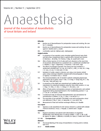
ARTHROPLASTY
Efficacy of ketamine, pregabalin, and combined analgesia in total hip arthroplasty
Anaesthesia. 2014 Jan;69(1):46-52142 patients scheduled for total hip arthroplasty were randomized to receive treatment with ketamine infusion during anaesthesia, preoperative oral pregabalin, combined ketamine and pregabalin, or placebo of both. The purpose was to determine if the combination of drugs was more efficacious than either alone. All patients received patient-controlled morphine analgesia postoperatively, and were evaluated for cumulative morphine consumption, pain at rest and on movement, side-effects experienced and secondary hyperalgesia for the first 48 postoperative hours. Compared to placebo, all other groups significantly reduced cumulative morphine dose, although there was no significant reduction in pain or opioid-related side-effects in any group.
Unlock the full ACE Report
You have access to {0} free articles per month.Click below to unlock and view this {1}
Unlock NowCritical appraisals of the latest, high-impact randomized controlled trials and systematic reviews in orthopaedics
Access to OrthoEvidence podcast content, including collaborations with the Journal of Bone and Joint Surgery, interviews with internationally recognized surgeons, and roundtable discussions on orthopaedic news and topics
Subscription to The Pulse, a twice-weekly evidence-based newsletter designed to help you make better clinical decisions
Exclusive access to original content articles, including in-house systematic reviews, and articles on health research methods and hot orthopaedic topics
Or upgrade today and gain access to all OrthoEvidence content for just $1.99 per week.
Already have an account? Log in


Subscribe to "The Pulse"
Evidence-Based Orthopaedics direct to your inbox.
{0} of {1} free articles
Become an OrthoEvidence Premium Member. Expand your perspective with high-quality evidence.
Upgrade Now












































































